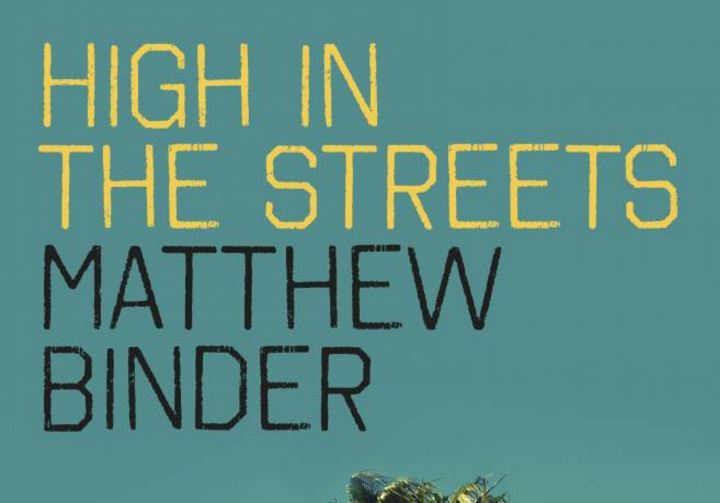
High In The Streets, Matthew Binder’s debut novel, follows the journey from comfort to depravity of Lou Brown, a successful novelist who can’t complete his second book, nor keep those around him happy. Lou quickly realises that it’s the success and comforts that this provided, that is keeping him far from his roots of living in squalor, and once he suspects that his wife is cheating on him, he allows himself to fall down the rabbit hole into self-destruction.
Binder creates an interesting character with Lou Brown. One of the immediate aspects of this novel that is we’re not looking at a man who is striving for the American dream, but ultimately a man who is in possession of it, and realises that it wasn’t enough to make him happy. Though, this does ultimately take some tension out of the novel, and despite Lou’s money dwindling his way, it’s difficult to imagine him inhibited to the point when he can’t buy cigarettes, drink, or entertain himself. There’s no tension that Lou’s antics will be inhibited by any external factors, as he is a man that marches to the beat of his own drum. In Lou’s life are his fiancé, Frannie, his best friend, the former sports star Cliff, and Lou’s agent, Sebastian.
To Binder’s credit, all of these characters seem fully formed. The backstory flows seamlessly into the novel, and each development from their past merges with the present well, and sheds insight that not all writers can pull off.
The problem is though that Lou often speaks unnaturally, and almost seems aware that he is a character in a novel. In normal situations he often speaks as if he constantly believes he is speaking golden philosophy, and sometimes this can feel contrived. Such as when he trades a kid a cigarette for Lord Of The Flies because the ideas in the book are worth a lot more than a dollar. This goes beyond Brown’s arrogance and character, and sometimes feels like the author channelling his own views to much. It’s like Californication except the arc, characters and dialogue never quite justify the actions of the lead. This is made much more obvious by the subplots which often feel more gripping and real than Lou’s own crisis. Such as with Cliff, who is in a perpetual battle to reunite with his son after messing up his early years of being a father.
Ultimately, this is a novel about a novelist who cannot write another novel. It doesn’t break boundaries, and some readers may find the way race and women are presented problematic. It’s clearly inspired by it’s influences, but doesn’t do much to surpass them. Matthew Binder may continue to be a great novelist, and there are plenty of moments in this book that are humorous, interesting, and achieve something noteworthy. A reader should just be aware that going into this, it’s a tale of excess that isn’t particularly excessive, and High In The Streets isn’t going to win the same critical acclaim that Lou Brown’s debut novel won him.
Some of the coverage you find on Cultured Vultures contains affiliate links, which provide us with small commissions based on purchases made from visiting our site.



